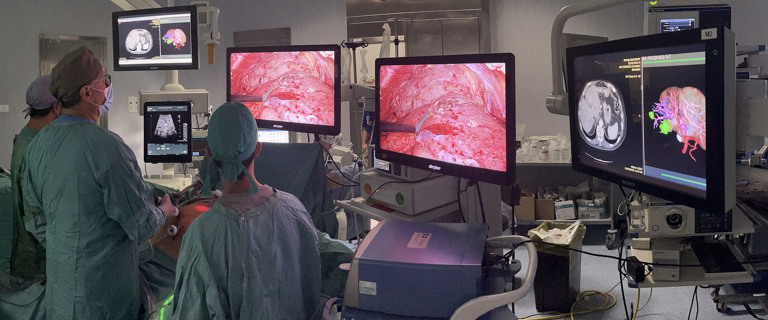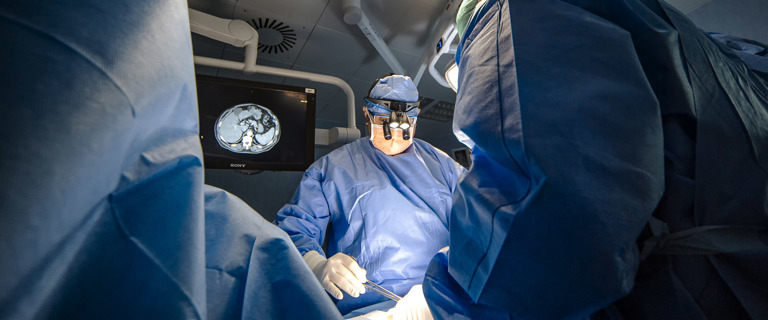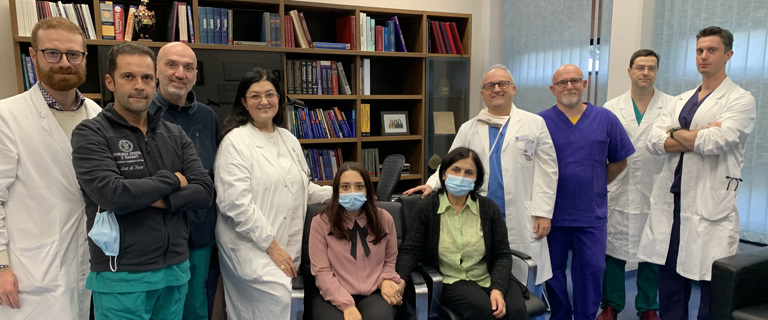Specialized Unit
Hepatobiliary and Pancreatic Surgery
Minimally Invasive and Robotic Surgery; Transplantation Service
The center
N of beds
Outpatient Clinic Rooms
Digitalized Operating Rooms
One shared robotic OR for HPB and General Surgery
Post Anesthesia Care Unit
The recently opened Hepato-Biliary-Pancreatic, Minimally Invasive and Robotic Surgery Center and the new Kidney Transplant Center of the Federico II University Hospital of Naples is directed by Prof. Roberto Ivan Troisi and is a Comprehensive Operating Unit within the Department of General Surgery, Transplantation and Gastroenterology.
The Center specializes in the surgical treatment of all malignant and benign diseases of the liver, pancreas and biliary tract. All types of surgical procedures of the liver (one- and two-stage liver resections, vascular and/or biliary reconstructions, microwave tumor ablations), biliary tract (cholecystectomies, biliary shunts and/or reconstructions) and pancreas (pancreatic head and body-tail resections, meso-pancreatectomies, acute and chronic pancreatitis surgery, as well as vascular reconstructions when indicated) are performed routinely. The approach for such pathologies is mainly minimally invasive i.e. laparoscopic or robotic.
Renal transplant activities have been implemented since 2022 with the Robotic Living Donor Transplantation Program. Transplant quality control is carried out through Transit Time Flow Measurement technology that can unveil even minor technical and anatomical abnormalities potentially affecting short-term organ function. In addition, in special cases, Machine Perfusion technology allows the successful use of organs from marginal donors and the entire logistics of the transplant program.
DIRECT LINE
7/7 DAYS FROM 8 AM TO 8 PM
338-9183621 (also whatsapp)
Mission
The " Division of Hepato-Biliary-Pancreatic, Minimally Invasive and Robotic Surgery, Kidney Transplantation Center" aims to diagnose and treat surgical diseases of the liver, biliary tract and pancreas as well as chronic renal failure.
These highly specialized and referral activities focus on:
- Specialized liver surgery: metastases, hepatocarcinoma, intrahepatic cholangiocarcinoma, hepatic hilum tumor (Klatskin) and gallbladder tumors, benign tumors requiring removal
- Pancreatic surgery (adenocarcinomas, IPMN, neuroendocrine tumors, treatment of acute and chronic pancreatitis)
- Treatment of chronic renal failure with cadaveric and living donor kidney transplantation
- The application of minimally invasive surgery techniques (robotic, laparoscopic and endoscopic) to the liver, biliary tract and pancreas as well as living donor kidney transplantation
- Researching, teaching and coordinating diagnostic, therapeutic and care pathways (PDTA) specific to the diseases treated at the AOU Federico II in Naples
- Promotion of multidisciplinary discussions of tumor pathologies (Multidisciplinary Oncology Groups-MTD’s- HCC, Pancreas, Cholangiocarcinomas, Neuroendocrine Tumors) with Gastroenterologists, Hepatologists, Oncologists, Abdominal Radiologists, Interventional Radiologists, Anatomopathologists, Radiation Therapists, Anesthesiologists and Psychologists, meetings run by our coordinators. In addition, multidisciplinary discussion includes also benign conditions such as acute and chronic pancreatitis, cystic lesions of the pancreas, and benign lesions of the liver and spleen for refinement of diagnosis and therapeutic indication
Vision
The strategic priorities of the center are:
- Admission and treatment of patients with hepato-biliopancreatic surgical diseases and/or specific complications;
- Admission of patients with chronic renal failure and treatment of related complications (infection and bleeding of polycystic kidneys in patients with ADPKD; indication for nephrectomy for other causes in patients to be listed or on the list for renal transplantation);
- Increase activities and quality of surgical services of liver, pancreas and biliary tract and renal/retroperitoneal diseases;
- Hepato-biliary-pancreatic and retroperitoneal surgical oncology;
- Offering robotic and laparoscopic surgical techniques to EBP and renal pathologies;
- Monitoring quality of care through periodic monitoring of performance, safety and efficacy indicators;
- Renewing and implementing highly specialized hepato-biliopancreatic procedures accordingly to international standards;
- Reducing postoperative morbidity of complex diseases through minimally invasive approach by employing advanced therapeutic protocols such as ERAS protocols that allow the best recovery after surgery;
- Reduction of hospitalization time;
- Monthly analysis of critical care issues (Morbidity Meeting);
- Optimization of surgical procedures that can be performed in day-hospital;





